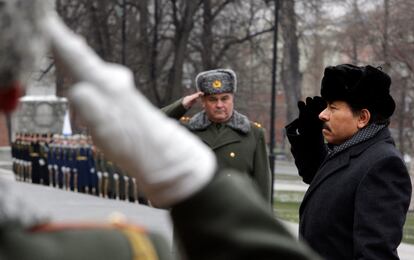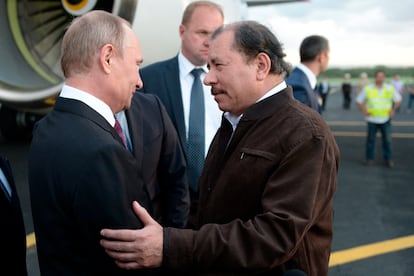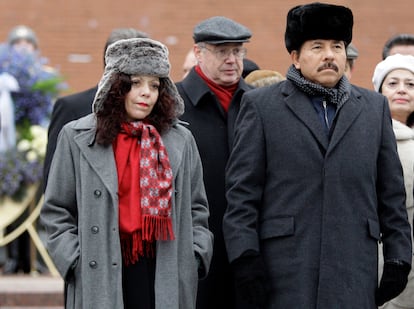Nicaragua’s Ortega strains US relations by expanding military ties with Russia
President Daniel Ortega welcomes more Russian military personnel and equipment to be stationed throughout Nicaragua


With relations between Nicaragua and the United States at their lowest point in years, former Sandinista guerrilla and current president Daniel Ortega’s new accord with Russia has just added fuel to the fire. Vladimir Putin’s propaganda machine kicked into high gear to publicize the Nicaraguan government’s recent announcement that it will begin receiving more Russian military personnel, ships, and aircraft starting July 1. Ortega’s regime has dubbed it “a military exchange, instruction, and training initiative to support humanitarian aid operations.” The announcement of this new Russian collaboration with Nicaragua follows Ortega’s defiance of the United States and the European Union when he supported Putin’s invasion of Ukraine. Ortega’s apparent diplomatic strategy is to use such initiatives to alleviate his country’s economic pain caused by international isolation and sanctions.
Decree 10-2022 approved by the Ortega-controlled legislature authorizes Russian military forces to “patrol” Nicaragua’s Caribbean and Pacific coasts. It also invites 80 Russian military advisors to join an in-country exercise with the Nicaraguan Army’s Special Operations Command “to exchange experiences and conduct training in humanitarian aid operations. Another 50 Russian military advisors will work with the Nicaraguan Navy, Air Force, and Communications Corps to “exchange experiences and assist with communication operations on ships and aircraft in their fight against drug trafficking and transnational organized crime.” The decree authorizes Russian ships and aircraft to enter Nicaraguan territorial waters and airspace.
Nicaraguan political analyst Roberto Cajina said the torrent of propaganda emanating from the Kremlin after Decree 10-2020 was passed constitutes a veiled threat to the United States. Russian state television anchor Olga Skabeeva gave extensive coverage to Ortega’s initiative and said, “It’s time for Russia to flex its muscles near some US cities.” TASS, a Russian state-owned news agency also widely disseminated news of the military agreement with Nicaragua, while Sputnik, another Russian state-owned news agency headlined a recent report: “Nicaragua: military cooperation with Russia will strengthen national security.” The Kremlin later tried to tone down the rhetoric and Foreign Ministry spokesperson Maria Zakharova dismissed the collaboration with Nicaragua as a “routine operation.”

Cajina said that the presence of foreign military personnel in Nicaragua is a normal part of a military exchange effort focused on training and support for humanitarian aid and the fight against organized crime. In fact, the recent decree authorizes the presence of Cuban, Mexican, Venezuelan, and Bolivian military forces in Nicaragua. But this is happening at a time, said Cajina, when Russia has lost international support due to its invasion of Ukraine, and Ortega was conspicuously left off the invitation list to the Summit of the Americas in Los Angeles. Ortega’s exclusion from the summit was another US effort to further isolate a repressive regime that violates human rights. “Russia wants to put a little pressure on the United States and deflect attention away from the invasion of Ukraine,” said Cajina. “But Moscow doesn’t actually have the capacity to send arms to Nicaragua like it did in 1962 during the Cuban missile crisis. It’s just another war of words in Ortega’s long-running confrontation with the United States. A real Russian military presence in Nicaragua would trigger a vigorous response from the US, because the threat would extend beyond Central America to the entire continent.”
Alarm bells have already sounded throughout Central America. Costa Rica President Rodrigo Chaves expressed his apprehension to a US media outlet at the Summit of the Americas. “At this time, we have serious concerns with Nicaragua and about the news that President Daniel Ortega invited the Russian army to send troops and equipment. We have not had an army [in Costa Rica] since 1949, so imagine how we feel. We’re worried, and with good reason,” said Chaves. His fears are justified, considering that Ortega has repeatedly demonstrated a willingness to destabilize the region. In the 1980s, President Ortega presided over a Sandinista-controlled government closely aligned with the Soviet-led socialist bloc that provided Nicaragua with substantial military aid. At the time, the US-financed “Contras” (Nicaraguan Resistance) were waging a war from their bases in Honduras to overthrow the Sandinista regime. The conflict produced a humanitarian crisis and exodus of Nicaraguan civilians that weighed heavily on Costa Rica.
It is unclear what Ortega expects from Putin. The two leaders have enjoyed a close relationship since 2008, when Ortega supported Russia’s annexation of Abkhazia and South Ossetia. At the time, Ortega was under heavy US pressure following allegations of massive fraud by the Sandinista National Liberation Front in the country’s municipal elections. In 2014, Ortega again supported Russia when it occupied Crimea, and was widely mocked on social media for establishing a consulate in Crimea when Nicaragua had absolutely no interests in the region. Vladimir Putin returned the favor by visiting Nicaragua later that year. Ortega welcomed Putin with a warm hug, but perhaps expected more in return than just a pat on the back.

The Nicaraguan government announced that Russia has funded a military training center to combat drug trafficking, and will provide aid to strengthen and modernize the Sandinista Army. Russia also granted Nicaragua US$26 million to address natural disasters. In 2016, Russia officially announced that it was sending Nicaragua an initial shipment of 20 T-72B tanks worth US$80 million. The Russian state-owned domestic news agency RIA Novosti stated that the Kremlin had already supplied Nicaragua with 12 ZU-23-2 anti-aircraft defense systems, two Mi-17V-5 helicopters, as well as a “shipment” of armored vehicles. Nicaragua has ordered four patrol boats from Russia, at a cost of approximately US$45 million. Other Russian aid to Nicaragua includes wheat shipments and buses to improve urban transportation in Managua.
Sergio Ramirez, the well-known Nicaraguan writer and winner of the Miguel de Cervantes Prize, now lives in exile in Spain. Ramirez, who was Ortega’s vice-president in the 1980s, scoffed at Moscow’s relationship with Ortega and told Nicaraguan digital magazine Divergentes that Russia “is not an effective ally for Ortega… because it is a paper tiger… that pretends to be a great superpower just because it has nuclear warheads. But if he [Putin] has to invest all of Russia’s resources in his war in Ukraine, what can he offer Ortega besides some buses that will break down in a year?” What then does Nicaragua gain from its relationship with Putin? “Practically nothing,” said Roberto Cajina. “Trade between Nicaragua and Russia is insignificant. In diplomatic terms, what Russia can offer Nicaragua has no great value in the global context. Nor does Moscow’s criticism of US sanctions against Nicaragua carry any weight.” But Daniel Ortega doggedly continues to stoke the flames of discord with the United States.
Tu suscripción se está usando en otro dispositivo
¿Quieres añadir otro usuario a tu suscripción?
Si continúas leyendo en este dispositivo, no se podrá leer en el otro.
FlechaTu suscripción se está usando en otro dispositivo y solo puedes acceder a EL PAÍS desde un dispositivo a la vez.
Si quieres compartir tu cuenta, cambia tu suscripción a la modalidad Premium, así podrás añadir otro usuario. Cada uno accederá con su propia cuenta de email, lo que os permitirá personalizar vuestra experiencia en EL PAÍS.
¿Tienes una suscripción de empresa? Accede aquí para contratar más cuentas.
En el caso de no saber quién está usando tu cuenta, te recomendamos cambiar tu contraseña aquí.
Si decides continuar compartiendo tu cuenta, este mensaje se mostrará en tu dispositivo y en el de la otra persona que está usando tu cuenta de forma indefinida, afectando a tu experiencia de lectura. Puedes consultar aquí los términos y condiciones de la suscripción digital.








































